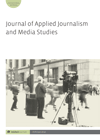
Full text loading...

The role of the media in informing the public has long been a central topic in journalism studies. Given that social media platforms have become today’s major source of news, it is important to understand the impact of social media use on citizens’ knowledge of current affairs. While people get news from multiple platforms throughout the day, most research treats social media as a single entity or examines only one or two major platforms ignoring newer social media platforms. Drawing on news snacking framework, this study investigates how using some of today’s most popular social media platforms predicts users’ current affairs knowledge, with particular attention to Snapchat and its news section Discover. A survey conducted in the United States (N=417) demonstrated that each of the platforms is distinct: Twitter is a strongly positive predictor of knowledge, Facebook a marginally significant negative predictor, Reddit a significantly negative predictor and Instagram not a significant predictor. Overall Snapchat use has no significant association with users’ knowledge of current affairs, whereas Discover use has a negative relationship. Further analysis revealed that mere exposure to Snapchat is positively related to soft-news knowledge and attention to Discover is negatively related to hard-news knowledge.

Article metrics loading...

Full text loading...
References


Data & Media loading...

Publication Date:
https://doi.org/10.1386/ajms_00047_1 Published content will be available immediately after check-out or when it is released in case of a pre-order. Please make sure to be logged in to see all available purchase options.